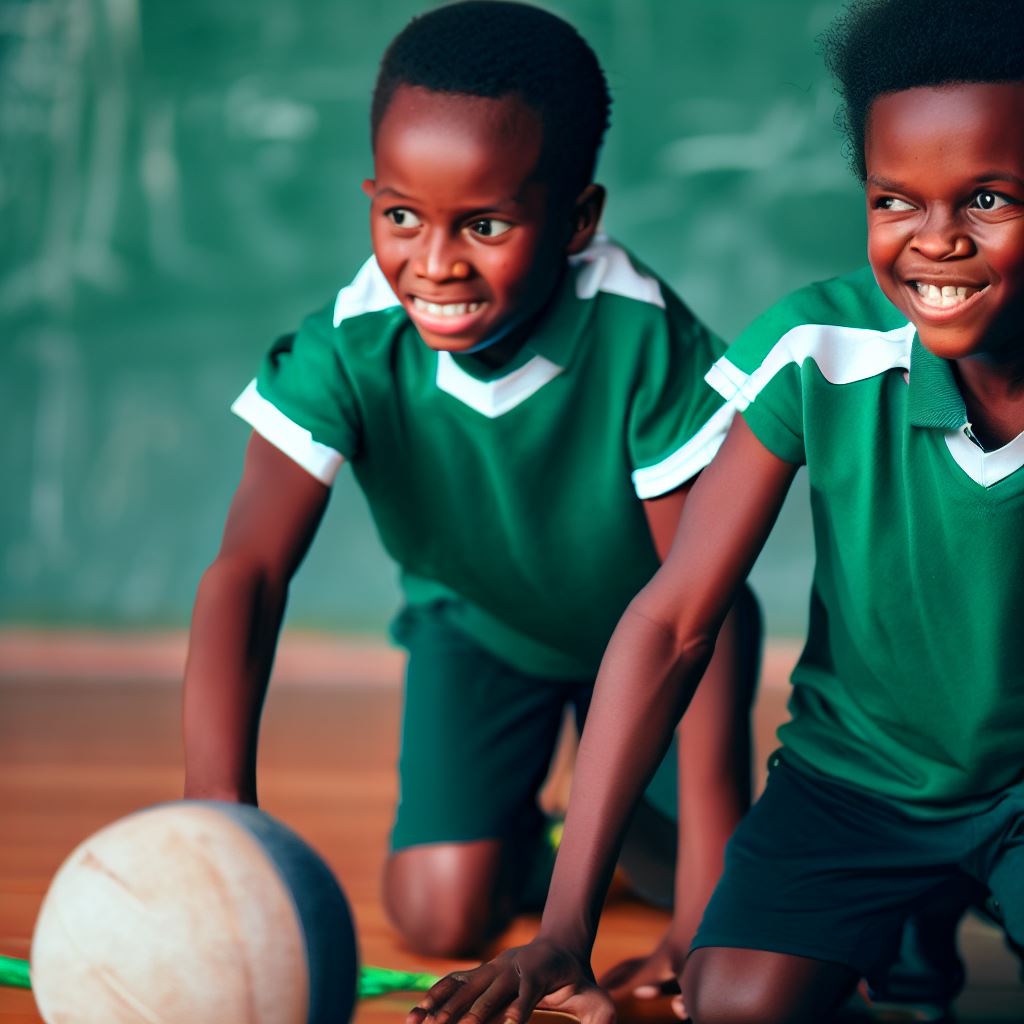Introduction
Training Tips from Assistant Athletic Trainers: In this blog Post, we will explore training tips from assistant athletic trainers in Nigeria.
Learning from professionals in different parts of the world is crucial for gaining a diverse and well-rounded knowledge of athletic training.
By examining the insights and expertise of trainers in Nigeria, we can discover new strategies and approaches to enhance athletic performance.
Key Points
- The importance of cross-cultural learning: Training tips from assistant athletic trainers in Nigeria provide valuable insights that can broaden our understanding of athletic training methods.
- Unique perspectives and experiences: Trainers in Nigeria may offer different perspectives due to varying cultural backgrounds, resources, and challenges they face.
- Adaptability and innovation: Learning from trainers in Nigeria can inspire us to think outside the box and develop innovative training techniques to improve athletic performance.
- Cultural diversity and global collaboration: Embracing knowledge from professionals worldwide fosters cultural diversity and promotes collaboration among trainers from different countries.
- Applying Nigerian training tips: By implementing tips and techniques shared by Nigerian trainers, athletes and trainers can potentially enhance their performance and achieve better results in their respective sports.
As athletic trainers, we should constantly seek opportunities to learn from professionals in different parts of the world, including Nigeria.
By exploring training tips from assistant athletic trainers in Nigeria, we can expand our knowledge, gain fresh insights, and ultimately improve our training practices.
Embracing a global perspective benefits both athletes and trainers, leading to enhanced athletic performance and the exchange of innovative ideas across borders.
Role of Assistant Athletic Trainers in Nigeria
In Nigeria, assistant athletic trainers play a crucial role in the sports industry. They are responsible for several important tasks, aimed at ensuring the well-being and performance of athletes.
One of the primary roles of assistant athletic trainers is to provide medical assistance to athletes. They assess injuries, provide immediate care, and develop treatment plans to aid in the recovery process.
Additionally, these trainers are in charge of creating and implementing injury prevention programs.
They educate athletes on proper techniques, warm-up exercises, and equipment usage to minimize the risk of injuries during training and competitions.
Assistant athletic trainers also assist in the rehabilitation process of injured athletes.
They design and supervise rehabilitation programs, which include targeted exercises and therapies to restore strength, mobility, and functionality.
Moreover, these trainers are responsible for monitoring the overall health and fitness of athletes.
They conduct regular medical check-ups, assess physical capabilities, and provide guidance on nutrition and hydration, ensuring optimal performance.
Assistant athletic trainers also contribute significantly to the development of sports in Nigeria. They play a vital role in talent identification and scouting for potential athletes with promising abilities.
Furthermore, these trainers actively participate in the coaching process.
They assist head coaches in planning training sessions, provide feedback on athletes’ performance, and offer suggestions for improving skills and tactics.
In addition to their direct role with athletes, assistant athletic trainers also contribute to the sports development in Nigeria by providing educational programs.
Read: An Overview: Assistant Athletic Trainer Career in Nigeria
Common Training Tips
When it comes to training, assistant athletic trainers in Nigeria have shared some valuable tips that can make a significant difference in performance.
These tips cover various aspects such as warm-up exercises, flexibility training, and injury prevention.
Here is a list of common training tips shared by assistant athletic trainers in Nigeria:
- Warm-up Exercises: Prioritize warm-up exercises to prepare the body for intense physical activity.
- Dynamic Stretching: Incorporate dynamic stretching routines into warm-up sessions for enhanced flexibility and mobility.
- Proper Technique: Emphasize the importance of using correct technique and form during training exercises.
- Strength Training: Include strength training exercises to build muscle power and improve overall athleticism.
- Rest and Recovery: Allow sufficient rest and recovery time between training sessions to avoid overexertion and injuries.
- Nutrition: Educate athletes about the significance of a well-balanced diet in fueling their bodies for optimal performance.
- Hydration: Stress the importance of proper hydration before, during, and after training or competitions.
- Mental Conditioning: Encourage athletes to develop mental toughness, resilience, and focus through techniques like visualization and meditation.
- Proper Gear and Equipment: Ensure athletes have appropriate gear and equipment that fit well and provide necessary support and protection.
- Regular Check-ups: Promote regular check-ups and medical evaluations to monitor overall health and address any potential issues early on.
These training tips are essential for enhancing athletic performance in Nigeria, and here’s why:
Warm-up exercises loosen up the muscles and increase blood flow, preparing the body for intense physical activity. They help prevent injuries and improve overall performance.
Dynamic stretching improves flexibility, mobility, and range of motion, enabling athletes to move more efficiently and effectively during training and competitions.
Emphasizing proper technique not only ensures maximal performance but also reduces the risk of injuries caused by incorrect movements and posture.
Read: Success Stories: Famous Nigerian Sports Information Directors
Nutritional Advice
Assistant athletic trainers in Nigeria provide invaluable nutritional advice to athletes to enhance their performance and overall health.
A balanced diet is crucial for athletes as it plays a significant role in optimizing their performance and aiding in injury prevention.
The Significance of a Balanced Diet for Athletes
A balanced diet is essential for athletes as it provides them with the necessary nutrients to meet their energy demands and optimize their performance. Here are some key reasons why a balanced diet is significant:
- Energy Boost: Consuming a balanced diet ensures athletes have sufficient energy levels to perform at their best during training and competitions.
- Muscle Growth and Repair: Adequate protein intake aids in muscle growth and repair, facilitating recovery after intense physical activities.
- Injury Prevention: Proper nutrition helps strengthen the immune system, reducing the risk of injuries and illnesses.
- Mental Focus: Certain nutrients, such as omega-3 fatty acids, contribute to brain health, improving mental focus and concentration.
Examples of Beneficial Nigerian Foods for Athletes
Nigeria is known for its rich culinary traditions, and many of its traditional foods offer excellent nutritional benefits for athletes. Here are some examples:
- Egusi Soup: Packed with protein, vitamins, and minerals, this popular Nigerian soup made with melon seeds is great for muscle recovery.
- Efo Riro: This traditional vegetable soup incorporates a variety of nutrient-dense greens, providing antioxidants and fiber for enhanced digestion.
- Brown Beans: Highly nutritious and rich in protein and fiber, brown beans are a great source of energy and essential minerals for athletes.
- Plantains: A staple in Nigerian cuisine, plantains are an excellent source of complex carbohydrates, providing sustainable energy for athletes.
- Pounded Yam with Egusi Soup: Pounded yam, a popular Nigerian staple, combined with the nutrient-dense egusi soup, offers a well-rounded meal for athletes.
These are just a few examples, and there are numerous other Nigerian foods that can contribute to a balanced diet for athletes.
Assistant athletic trainers in Nigeria often work closely with nutritionists and dieticians to develop personalized nutrition plans based on individual athletes’ needs and goals.
It is important for athletes to remember that proper hydration is also essential. Drinking enough water throughout the day is crucial for maintaining optimal performance and preventing dehydration.
Assistant athletic trainers in Nigeria provide crucial nutritional advice to athletes, emphasizing the significance of a balanced diet.
By incorporating nutrient-rich Nigerian foods into their meals, athletes can fuel their bodies, enhance performance, and maintain overall health.
Read: Job Opportunities in Sports Information Direction in Nigeria

Techniques for Mental Preparation
Assistant athletic trainers in Nigeria understand the importance of mental preparation for athletes. They have shared various techniques which can help athletes develop mental resilience and focus.
1. Explore the mental preparation techniques shared by assistant athletic trainers in Nigeria
Assistant athletic trainers in Nigeria have shared valuable mental preparation techniques that can benefit athletes in their training and competitions.
These techniques have been proven effective in enhancing mental resilience and focus.
2. Importance of developing mental resilience and focus
Mental resilience and focus are crucial for athletes to perform at their best.
Assistant athletic trainers in Nigeria emphasize the significance of developing these qualities for athletes to succeed in both training and competitions.
Athletes who possess mental resilience are better able to overcome challenges and setbacks. They are more likely to bounce back from failures and maintain a positive mindset throughout their athletic journey.
Focusing on the present moment is also essential for athletes. By remaining focused, athletes can concentrate on their performance and make quick decisions, leading to better outcomes.
3. Specific strategies such as visualization, meditation, and goal-setting
Assistant athletic trainers in Nigeria suggest specific strategies that athletes can incorporate into their mental preparation routine:
- Visualization: Athletes can visualize themselves successfully executing their skills and achieving their goals. This helps in building confidence and preparing the mind for optimal performance.
- Meditation: Practicing mindfulness meditation can help athletes calm their minds, reduce stress, and improve focus. It allows them to stay present and perform at their peak level.
- Goal-setting: Setting clear and achievable goals provides athletes with direction and motivation. It helps them remain focused and committed to their training and competitions.
By implementing these strategies consistently, athletes can enhance their mental preparation and ultimately improve their performance.
Assistant athletic trainers in Nigeria have shared valuable techniques for mental preparation. Developing mental resilience and focus is essential for athletes to overcome challenges and perform at their best.
Techniques such as visualization, meditation, and goal-setting can significantly enhance an athlete’s mental preparation and help them achieve their goals.
Read: Challenges Faced by Sports Information Directors in Nigeria
Sports Psychology Insights
When it comes to sports, the mental aspect plays a crucial role in an athlete’s performance.
Assistant athletic trainers in Nigeria have provided valuable insights into sports psychology, highlighting its importance for success. In this section, we will explore their thoughts and recommendations.
Impact of Mental Health on Athletic Performance
- Mental health directly affects an athlete’s ability to perform at their best.
- Assistant athletic trainers emphasize the significance of a positive mindset for success.
- Anxiety, stress, and low self-esteem can hinder performance and undermine an athlete’s confidence.
- Addressing mental health issues is essential to optimize athletic performance.
- A supportive environment that prioritizes mental well-being can lead to improved outcomes.
Techniques for Managing Stress and Anxiety in Sports
- Assistant athletic trainers highlight the importance of developing effective stress management strategies.
- Meditation and mindfulness techniques help athletes stay focused and calm under pressure.
- Visualization exercises enable athletes to mentally rehearse success and build confidence.
- Breathing exercises and progressive muscle relaxation help alleviate physical and mental tension.
- Goal-setting and positive self-talk are vital tools for managing anxiety and maintaining a winning mindset.
Building Mental Resilience
- Assistant athletic trainers stress the need for building mental resilience in athletes.
- Developing a growth mindset helps athletes embrace challenges and bounce back from setbacks.
- Teaching athletes to focus on the process rather than solely on outcomes enhances mental fortitude.
- Encouraging self-reflection and learning from failures fosters mental strength and personal growth.
- Creating a supportive team culture where athletes can openly discuss their struggles enhances resilience.
The Role of Sports Psychology Professionals
- Assistant athletic trainers suggest involving sports psychology professionals in athlete development programs.
- These professionals can provide specialized guidance and support for mental well-being.
- Collaboration between trainers, coaches, and sports psychologists can optimize an athlete’s performance.
- Psychological assessments and interventions can identify and address underlying mental obstacles.
- Sports psychology professionals also contribute to enhancing team dynamics and overall athlete satisfaction.
Sports psychology insights from assistant athletic trainers in Nigeria demonstrate the importance of mental health in athletic performance.
By understanding and addressing mental well-being, athletes can unlock their potential and achieve greater success.
Implementing stress management techniques, building mental resilience, and integrating sports psychology professionals can all contribute to an athlete’s holistic development.
It is crucial for athletes, trainers, coaches, and sports organizations to prioritize mental health and embrace the power of sports psychology in Nigeria’s sporting landscape.
Uncover the Details: Technology’s Role in Assistant Coaching in Nigeria
Recovery and Injury Management
When it comes to recovery and injury management, assistant athletic trainers in Nigeria provide valuable tips and advice.
These tips not only help athletes heal and get back on their feet, but also prevent further injuries in the future.
1. Emphasis on Rest
One of the key tips given by assistant athletic trainers is the significance of rest. Resting allows the body to recover and repair itself, giving injured athletes the time they need to heal properly.
Assistant athletic trainers recommend athletes to take designated rest days to allow their bodies to recover from intense workouts and strenuous activities.
They emphasize the importance of not pushing through pain and listening to their bodies.
2. Proper Sleep
In addition to rest, proper sleep plays a vital role in the recovery process. Assistant athletic trainers emphasize the importance of getting enough sleep for athletes to heal and recharge.
They explain that during sleep, the body produces growth hormones that aid in tissue repair and regeneration. Lack of sleep can compromise the recovery process and increase the risk of further injuries.
To optimize sleep quality, they recommend athletes to establish a consistent sleep schedule, create a comfortable sleep environment, and avoid electronic devices before bed.
3. Rehabilitation Exercises
Assistant athletic trainers also highlight the significance of rehabilitation exercises in the recovery process. These exercises help athletes regain strength, flexibility, and mobility after an injury.
They provide specific exercises tailored to the athlete’s injury, focusing on stretching, strengthening, and conditioning the injured areas.
These exercises help promote healing and prevent the reoccurrence of injuries.
Assistant athletic trainers closely monitor the athletes during these exercises, ensuring proper form and technique to maximize effectiveness and minimize the risk of further damage.
4. The Role of Assistant Athletic Trainers
In the recovery process, assistant athletic trainers play a crucial role in providing support and guidance to injured athletes.
They work closely with athletes, coaches, and medical professionals to create personalized recovery plans.
Assistant athletic trainers assess the severity of the injury, provide initial first aid and immediate care, and evaluate the progress of the recovery.
They offer a range of modalities such as heat therapy, cold therapy, and electrical stimulation to aid the healing process.
They also provide essential education on injury prevention, proper form and technique, and the importance of taking care of one’s body.
Assistant athletic trainers serve as a resource for athletes, answering questions and addressing concerns throughout the recovery journey.
Recovery and injury management are critical aspects of an athlete’s journey, and assistant athletic trainers in Nigeria offer valuable tips and support in this process.
Through emphasizing rest, proper sleep, and rehabilitation exercises, they guide athletes towards a successful recovery and help prevent further injuries.
Their expertise and involvement contribute significantly to an athlete’s overall well-being and performance.
Conclusion
Training tips from assistant athletic trainers in Nigeria offer valuable insights for athletes and fitness enthusiasts.
These trainers have extensive experience and knowledge in optimizing performance and preventing injuries.
By incorporating their tips into our own training routine, we can improve our athletic performance and stay injury-free.
It is important to learn from these trainers to gain a holistic approach to training.
Their expertise can provide us with new perspectives and strategies for achieving our fitness goals.
So, let’s embrace the wisdom shared by assistant athletic trainers in Nigeria and take our training to the next level!




